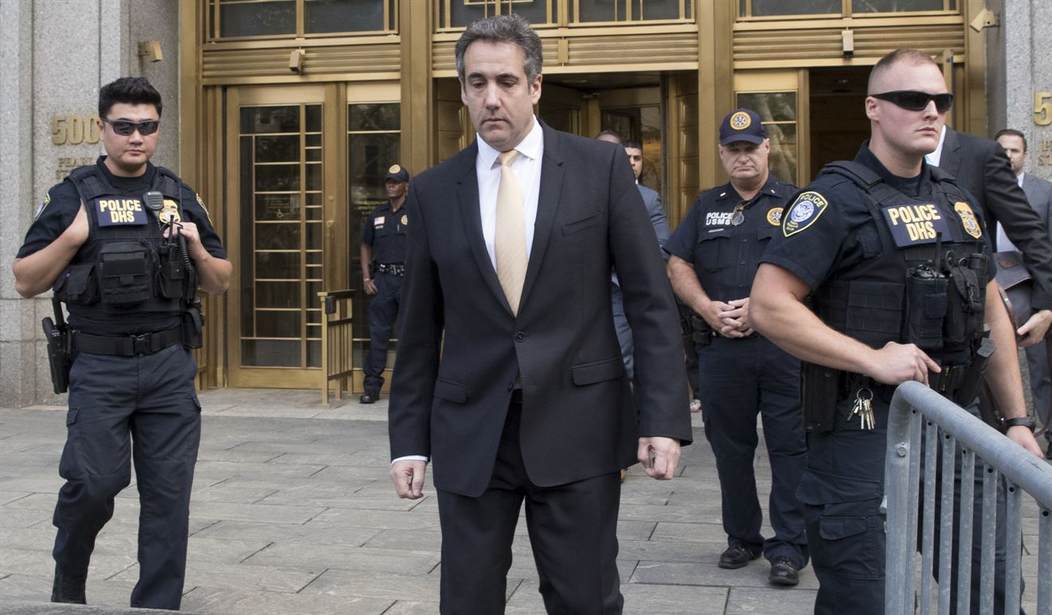Let’s stipulate that there are competing choruses taking to the risers. One will sing loudly that every rotten thing critics have been spouting about President Trump must be true now that Paul Manafort is a convicted felon and Michael Cohen has struck a plea deal.
On the other stage, Trump supporters will spin that the fall of two shady characters is no great stain on the president, and that in fact this is another occasion containing no evidence of Russian election collusion.
So, on the first full day of digesting an explosive day of court action, what are the ramifications for Trump, legally and politically?
The simple answer first: the Manafort verdict is meaningless on both fronts. His crimes had nothing to do with Trump or the 2016 campaign.
The Cohen plea deal is a starkly different matter. As Trump’s attorney, he engineered the payment of funds to two accusers to keep their stories of salacious affairs out of the news as the 2016 election approached.
But the question will be: Does that make them campaign contributions? If so, they far exceed the limits permitted by law. The plea deal contains Cohen’s own assertion that those funds were intended to affect the election result. Case closed, right?
Not so fast. Who knows what kind of stretch Cohen was willing to undertake in order to cut a deal mitigating his punishment? Plea deals, by their nature, are negotiations that afford prosecutors and defendants a portion of what they want. Michael Cohen wants to avoid dying of old age in prison. It would be a fairly tiny price to color the Stormy Daniels and Karen McDougal payoffs as intentional campaign spending, even if they were not.
Recommended
This will be the battleground as Trump’s tormentors seek to ramp this up to an impeachable offense, while his defenders circle the wagons of damage control. So if objectivity is possible, a question: Can the argument be made that those payoffs were a protective strategy that would have been made even if there were no election?
Of course it can; it already has, by Rudy Giuliani three months ago when he described those financial arrangements as separate from the campaign operation. Does any expenditure in an election season automatically count as a campaign cost?
The answer may lie with the famous private citizens who have opened big checkbooks to dissuade publicity or lawsuits. Michael Jackson heaped $20 million onto an accuser and his family in 1994 to extinguish a civil suit stemming from molestation claims. This week’s headlines contain the stories of nearly $400,000 paid to a teenage actor to restrain sexual assault allegations against actress Asia Argento. Neither effort was connected to a quest for political office. It is very nearly a law of physics: famous people will often face damaging accusations, and when they do, they may pay large settlements to make those stories go away, whether true or not.
Trump, his attorneys and his defenders are free to paint the payoffs as an understandable path any famous private citizen might pursue. What they will face now is an army of opponents clamoring for Trump to be subpoenaed if not indicted.
It is arguable whether either of those can happen. It is a chaotic prospect to imagine presidents subject to local district attorneys wielding court orders that can bring the nation’s business to a halt. As a necessary exercise in consistency, I would assert that even if we were enduring a Hillary Clinton presidency, she would be similarly immune from the Manhattan phone book of charges that would hang over her head as a result of her email scandals and the blatant mishandling of classified documents.
So here we are. The usual voices calling for Trump to be drawn and quartered will claim sweet vindication of some sort. Trump will probably not plumb the depths of detail about the payoffs, leaving Giuliani and others to assert that they were not campaign contributions, even if Cohen said they were under pressure from ambitious prosecutors.
Look for Cohen to be characterized as a sleazy opportunist, fabricating the campaign law angle to save some portion of his hide. If that effort begins to stick, it will come in handy in a defense against the other bear trap that lies ahead for Trump— the Cohen claim that however they are defined, the payments were pre-approved by the candidate, despite his famous Air Force One video clip saying he was unaware.
The complete absence of Russia collusion evidence creates a burning hunger among Trump-haters for some storyline to stoke in pursuit of impeachment. The spring in their step will last for a while, but their ultimate goal requires a transfer of the stench of guilt from Michael Cohen to his client. That path seems blocked by procedural and possibly factual obstacles.
The greatest likelihood is that the people who despise Trump will add this to their reasons why, while the millions who voted for him will absorb and process this latest drama, and then get on with their lives.

























Join the conversation as a VIP Member